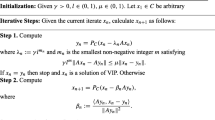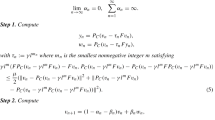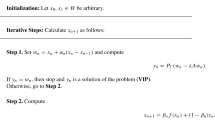Abstract
In this article, we introduce linearized Douglas–Rachford method for solving Lipschitz continuous variational inequalities in Hilbert space. First, we show the linear convergence of linearized Douglas–Rachford method with the fixed stepsize for the strongly monotone mapping. The usual drawback of algorithms with the fixed stepsize is the requirement to know the Lipschitz constant of the mapping. To avoid this, we present linearized Douglas–Rachford method with the diminishing stepsize whose convergence is established for the strongly pseudomonotone mapping. Finally, preliminary results from numerical experiments are promising.



Similar content being viewed by others
Data availability
Data sharing not applicable to this article as no datasets were generated or analyzed during the current study.
References
Antipin AS (1976) On a method for convex programs using a symmetrical modification of the Lagrange function. Ekon Mat Metody 12:1164–1173
Bauschke HH, Combettes PL (2017) Convex analysis and monotone operator theory in Hilbert spaces, 2nd edn. Springer, Berlin
Bello Cruz JY, Iusem AN (2010) Convergence of direct methods for paramonotone variational inequalities. Comput Optim Appl 46:247–263
Berinde V (2006) Iterative approximation of fixed points. Springer, Berlin
Bertsekas DP (1999) Nonlinear programming. Athena Scientific, Cambridge
Byrne C (2004) A unified treatment of some iterative algorithms in signal processing and image reconstruction. Inverse Probl 20:103–120
Censor Y, Gibali A, Reich S (2011) The subgradient extragradient method for solving variational inequalities in Hilbert space. J Optim Theory Appl 148:318–335
Dong QL, Cho YJ, Zhong LL, Rassias ThM (2018) Inertial projection and contraction algorithms for variational inequalities. J Glob Optim 70:687–704
Dong QL, Gibali A, Jiang D, Ke SH (2018) Convergence of projection and contraction algorithms with outer perturbations and their applications to sparse signals recovery. J Fixed Point Theory Appl 20:16
Dong QL, He S, Rassias MT (2021) General splitting methods with linearization for the split feasibility problem. J Glob Optim 79:813–836
Dong QL, He S, Liu L (2021) A general inertial projected gradient method for variational inequality problems. Comput Appl Math 40:168
Facchinei F, Pang JS (2003) Finite-dimensional variational inequalities and complementarity problems. Springer series in operations research, vol I and II. Springer, New York
Hai TN (2020) On gradient projection methods for strongly pseudomonotone variational inequalities without Lipschitz continuity. Optim Lett 14:1177–1191
Harker PT, Pang JS (1990) A damped-Newton method for the linear complementarity problem. In: Allgower G, Georg K (eds) Computational solution of nonlinear systems of equations, lectures in appl. Math., vol. 26. AMS, Providence, pp 265–284
He B (1997) A class of projection and contraction methods for monotone variational inequalities. Appl Math Optim 35:69–76
Hieu DV, Thong DV (2018) New extragradient-like algorithms for strongly pseudo-monotone variational inequalities. J Glob Optim 70:385–399
Khanh PD, Vuong PT (2014) Modified projection method for strongly pseudomonotone variational inequalities. J Glob Optim 58:341–350
Korpelevich GM (1976) The extragradient method for finding saddle points and other problems. Ekon Mat Metody 12:747–756
Mainge PE, Gobinddass ML (2016) Convergence of one-step projected gradient methods for variational inequalities. J Optim Theory Appl 171:146–168
Malitsky Y (2015) Projected reflected gradient methods for variational inequalities. SIAM J Optim 25(1):502–520
Malitsky YV, Semenov VV (2014) An extragradient algorithm for monotone variational inequalities. Cybern Syst Anal 50:271–277
Shehu Y, Iyiola OS (2020) Projection methods with alternating inertial steps for variational inequalities: weak and linear convergence. Appl Numer Math 157:315–337
Solodov MV, Svaiter BF (1999) A new projection method for variational inequality problems. SIAM J Control Optim 37:765–776
Thong DV, Hieu DV (2018) Inertial extragradient algorithms for strongly pseudomonotone variational inequalities. J Comput Appl Math 341:80–98
Tseng P (2000) A modified forward-backward splitting method for maximal monotone mappings. SIAM J Control Optim 38:431–446
Yang Q (2005) On variable-step relaxed projection algorithm for variational inequalities. J Math Anal Appl 302:166–79
Yang J, Liu H (2018) A modified projected gradient method for monotone variational inequalities. J Optim Theory Appl 179:197–211
Yao Y, Marino G, Muglia L (2014) A modified Korpelevich’s method convergent to the minimum-norm solution of a variational inequality. Optimization 63:559–569
Acknowledgements
The authors would like to express their deep gratitude to the anonymous referee for the valuable comments and suggestions, which led to a large improvement of the manuscript. The authors are grateful to Professor Songnian He for helpful discussion in Lemma 5, Example 1 and Remark 3. This work was Scientific Research Project of Aeronautical Science Foundation of China (20200008067001).
Author information
Authors and Affiliations
Corresponding author
Ethics declarations
Conflict of interest
The authors declare that they have no conflict of interest.
Additional information
Communicated by Andreas Fischer.
Publisher's Note
Springer Nature remains neutral with regard to jurisdictional claims in published maps and institutional affiliations.
Rights and permissions
Springer Nature or its licensor (e.g. a society or other partner) holds exclusive rights to this article under a publishing agreement with the author(s) or other rightsholder(s); author self-archiving of the accepted manuscript version of this article is solely governed by the terms of such publishing agreement and applicable law.
About this article
Cite this article
Dong, QL. Linearized Douglas–Rachford method for variational inequalities with Lipschitz mappings. Comp. Appl. Math. 42, 319 (2023). https://doi.org/10.1007/s40314-023-02466-9
Received:
Revised:
Accepted:
Published:
DOI: https://doi.org/10.1007/s40314-023-02466-9
Keywords
- Variational inequalities
- Linearized Douglas–Rachford method
- Projected gradient method
- Strongly monotone
- Strongly pseudomonotone




